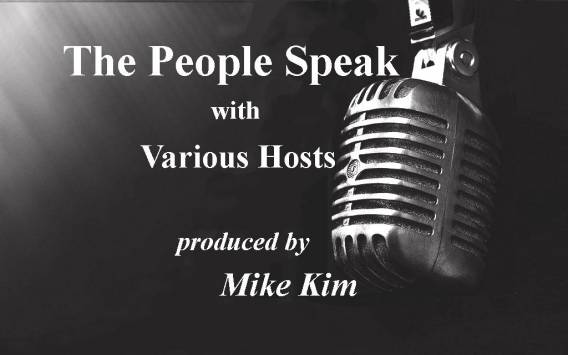The People Speak

The People Speak has evolved over the years with many great guests who have been interviewed by some very fine hosts.
We are a 55 minute show airing every other Sunday between 5-6pm Pacific/8-9pm Eastern. The show features a guest interview from any number of realms of interest (entertainment, science, philosophy, healing, spirituality, activism, politics, literature, etc.).
The guests share their stories, lives, strategies, books, philosophy, films, music, or whatever it is they use as a vehicle for making a difference for the better.
The radio show name, The People Speak, is based on the idea of allowing our audience - the People - a chance to interact with the guests during the hour, and we take phone or text questions from them during the interview.
Past guests include such notables as Nobel Peace Laureate Archbishop Desmond Tutu, the late Howard Zinn, Nobel Laureates Mairead Maguire, Shirin Ebadi, Kathryn Najimy, Oliver Stone, Jesse Ventura, Richard Belzer, Cynthia McKinney, Cindy Sheehan, Scott Horton, Joan Jett, Willie Nelson, George Galloway, Roseanne Barr, Ed Asner, Chevy Chase, as well as various reps from Amnesty International, UN World Food Programme, and many others.
Guest, John Pilger

John Pilger was born and grew up in Bondi, Sydney, Australia. He launched his first newspaper at Sydney High School and later completed a four year cadetship with Australian Consolidated Press. "It was one of the strictest language courses I know," he says. "Devised by a celebrated, literate editor, Brian Penton, the aim was economy of language and accuracy. It certainly taught me to admire writing that was spare, precise and free of cliches, that didn't retreat into the passive voice and used adjectives only when absolutely necessary. I have long since slipped that leash, but those early disciplines helped shape my journalism and writing and my understanding of moving and still pictures".
Like many of his Australian generation, Pilger and two colleagues left for Europe in the early 1960s. They set up an ill-fated freelance 'agency' in Italy (with the grand title of 'Interep') and quickly went broke. Arriving in London, Pilger freelanced, then joined Reuters, moving to the London Daily Mirror, Britain's biggest selling newspaper, which was then changing to a serious tabloid.
He became chief foreign correspondent and reported from all over the world, covering numerous wars, notably Vietnam. Still in his twenties, he became the youngest journalist to receive Britain's highest award for journalism, Journalist of the Year and was the first to win it twice. Moving to the United States, he reported the upheavals there in the late 1960s and 1970s. He marched with America's poor from Alabama to Washington, following the assassination of Martin Luther King. He was in the same room when Robert Kennedy, the presidential candidate, was assassinated in June 1968.
His work in South East Asia produced an iconic issue of the London Mirror, devoted almost entirely to his world exclusive dispatches from Cambodia in the aftermath of Pol Pot's reign. The combined impact of his Mirror reports and his subsequent documentary, Year Zero: the Silent Death of Cambodia, raised almost $50 million for the people of that stricken country. Similarly, his 1994 documentary and dispatches report from East Timor, where he travelled under cover, helped galvanise support for the East Timorese, then occupied by Indonesia.
In Britain, his four-year investigation on behalf of a group of children damaged at birth by the drug Thalidomide, and left out of the settlement with the drugs company, resulted in a special settlement.
His numerous documentaries on Australia, notably The Secret Country (1983), the bicentary trilogy The Last Dream (1988), Welcome to Australia (1999) and Utopia (2013) all celebrated and revealed much of his own country's 'forgotten past', especially its indigenous past and present.
He has won an Emmy and a BAFTA for his documentaries, which have also won numerous US and European awards, such as as the Royal Television Society's Best Documentary.
His articles appear worldwide in newspapers such as the Guardian, the Independent, the New York Times, the Los Angeles Times, the Mail & Guardian (South Africa), Aftonbladet (Sweden), Il Manifesto (Italy). He writes a regular column for the New Statesman, London. In 2001, he curated a major exhibition at the London Barbican, Reporting the World: John Pilger's Eyewitness Photographers, a tribute to the great black-and-white photographers he has worked alongside. In 2003, he was awarded the prestigous Sophie Prize for '30 years of exposing injustice and promoting human rights.' In 2009, he was awarded the Sydney Peace Prize.










